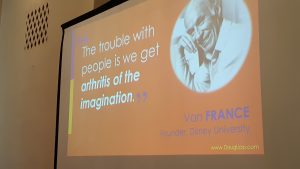This week I want to highlight just one topic because I feel it is that important. The image below is about the concept that you shouldn’t limit what is possible by giving up. I feel that we can use this philosophy in many aspects of our lives. Below you’ll find the image that inspired my blog topic this week and my thoughts on its implications.
Disclaimer: The views and opinions expressed below are those of Mark Pew, Senior Vice President of Product Development and Marketing, and do not necessarily reflect the views of Preferred Medical.
Arthritis of the Imagination

Van France, the founder of Disney University, wasn’t afraid to be a leader and create change with his new ideas. Based on the above quote and his life philosophy, France is saying that people give up too easily when they don’t know the solution to a problem and that is what limits our success.
Mark’s Thoughts:
So true. Children start with a blank slate. Sadly, as they mature they learn what can be imagined might not be doable. What appeared to be wide open is actually constricted (at least in their mind’s eye). Are they naive at the beginning? Or jaded by the journey? According to Healthline, arthritis is caused by normal wear and tear, an infection or injury, and family history. As a corollary for what Mr. France reportedly said, the causes of “arthritis of imagination” can be repeated failure (trying and not succeeding then giving up), a traumatic event (creating psychosocial issues and lack of resilience), and a poor support system (family and friends that tear down, not lift up). What’s the worst thing that can happen with “arthritis of the imagination?” You give up. But should you limit what is possible by giving up? I don’t think so. And neither did a bunch of other creative, imaginative people. For example, Thomas Edison. His “teachers said he was ‘too stupid to learn anything.’ He was fired from his first two jobs for being ‘non-productive.’ As an inventor, Edison had 1,000 unsuccessful attempts at inventing the light bulb. When a reporter asked, ‘How did it feel to fail 1,000 times?’ Edison replied, ‘I didn’t fail 1,000 times. The light bulb was an invention with 1,000 steps.'” But his imagination (and diligence to overcome failure) didn’t stop at the incandescent light bulb. He also invented the phonograph, microphone, and batteries (among other things). Can you imagine our world without artificial light or the ability to listen to music without the band in front of us? Massive numbers of failure did not produce arthritis of imagination. Instead it produced an intense desire to overcome. Imagination is the primary driver of success. Where are you on the “arthritis of imagination” spectrum? Have you given up on being your best you? As long as you’re still breathing, there’s hope.
To read everything on my mind this past week, please visit me on LinkedIn at https://www.linkedin.com/pulse/marks-musings-november-26-mark-rxprofessor-pew/.
Until next week,

